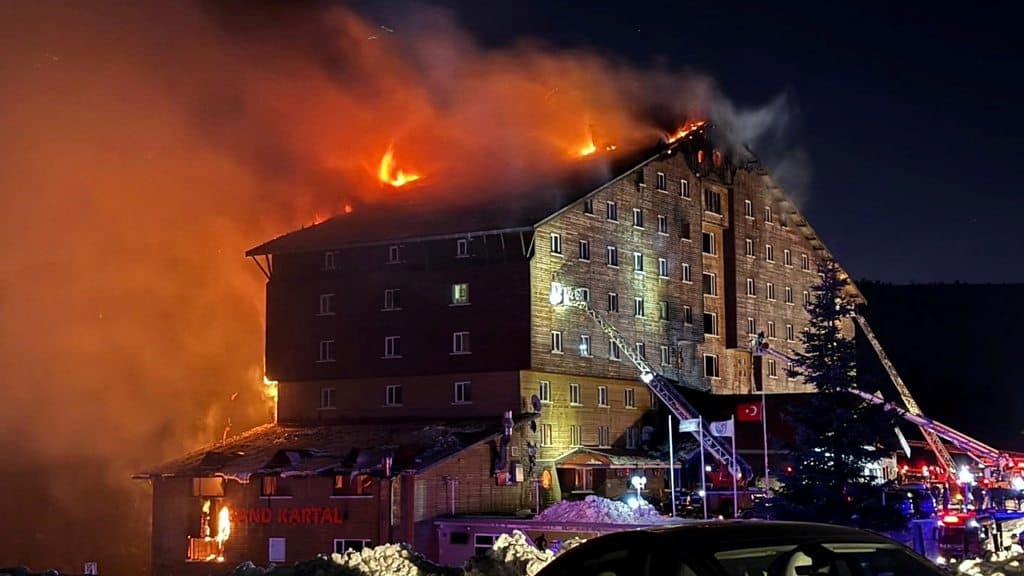We're loading the full news article for you. This includes the article content, images, author information, and related articles.
A Turkish court has sentenced a hotel owner, his family, and public officials to life in prison for gross negligence leading to a fire that killed 78 people, a verdict that underscores the severe consequences of ignoring safety standards in the global tourism industry.

A Turkish court on Friday, October 31, 2025, sentenced 11 people, including a prominent hotel owner and local officials, to life in prison over a catastrophic fire that killed 78 people, 34 of them children, at a popular ski resort. The verdict concludes a landmark case that has scrutinized safety regulations and accountability in Turkey's tourism sector.
The blaze erupted in the early hours of January 21, 2025, at the Grand Kartal Hotel in Kartalkaya, a mountain resort in Bolu province. The fire, which started in the hotel's restaurant just before 3:30 a.m. local time, tore through the 12-storey building, trapping many of the 238 registered guests as they slept. The incident, occurring during the busy winter school holidays, resulted in 137 injuries in addition to the fatalities.
The Bolu 1st High Criminal Court found Halit Ergül, the hotel's owner, his wife, and two daughters—all members of the hotel's board—guilty of “killing with possible intent” through severe negligence. Also receiving life sentences were Bolu's deputy mayor and the local fire chief, among others. In total, 32 people faced charges in connection with the disaster.
An official inquiry laid bare a series of critical safety failures at the hotel. Investigators found that the fire alarm system was not operational on the night of the blaze. Furthermore, essential gas equipment failed to meet mandatory safety standards. Survivors gave harrowing testimony, describing a lack of functioning fire doors, safe exits, and sprinkler systems, which forced some terrified guests to jump from windows or use bedsheets as ropes to escape. The indictment detailed how stairwells and elevator shafts acted as chimneys, channeling toxic fumes to the upper floors, while a lack of emergency lighting and signage hampered evacuation efforts.
During the trial, Mr. Ergül denied responsibility, claiming the hotel underwent regular inspections and shifting blame to the gas equipment supplier and the tourism ministry for oversight failures. However, the court's decision, which applied no sentence reductions, was met with applause and tears of relief from victims' families who had gathered at the courthouse, many holding photographs of their lost loved ones. Hilmi Altin, who lost his wife and nine-year-old daughter, told AFP news agency, "I go to the cemetery each day. No psychologist can ease such a pain."
The Grand Kartal Hotel fire stands as one of the deadliest in Turkey's modern history and has prompted widespread calls for stricter enforcement of safety regulations within the country's vital tourism industry. Following the disaster, Turkish authorities reportedly shut down thousands of tourism facilities for fire safety violations, highlighting systemic issues with regulatory oversight.
While this incident has no direct link to Kenya, the verdict serves as a powerful global precedent for the hospitality sector. For Kenya and the broader East Africa region, where tourism is a cornerstone of the economy, the case is a stark reminder of the paramount importance of rigorous safety standards, regular and transparent inspections, and the legal and moral responsibility of property owners and public officials to ensure guest safety. The life sentences demonstrate a growing intolerance for negligence and underscore the severe legal consequences for those who fail to uphold their duty of care, a lesson that resonates with tourism stakeholders worldwide.
Keep the conversation in one place—threads here stay linked to the story and in the forums.
Other hot threads
E-sports and Gaming Community in Kenya
Active 8 months ago
The Role of Technology in Modern Agriculture (AgriTech)
Active 8 months ago
Popular Recreational Activities Across Counties
Active 8 months ago
Investing in Youth Sports Development Programs
Active 8 months ago